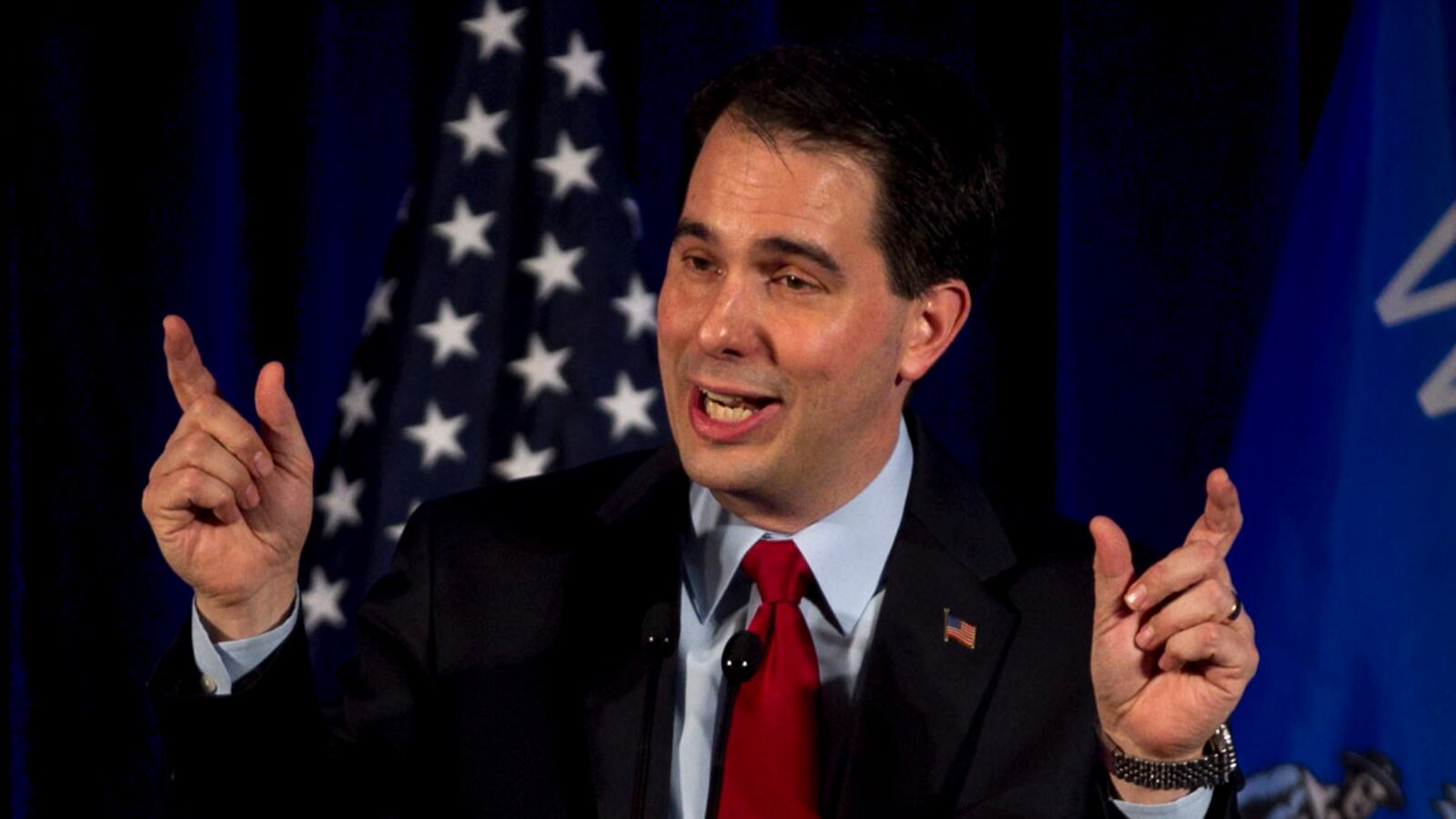When Scott Walker, freshly elected as governor, dropped his bombshell proposal to revoke the collective bargaining rights of Wisconsin's public employees, protest erupted. Kim Cosier was right in the middle of it all. “It was exhilarating,” says the University of Wisconsin assistant professor of arts education. “We were in the center of the Capitol when the firefighters marched in. I felt more American than I've ever felt, standing there, singing the national anthem, like we were finally participating in our own government.”
But just days before Tuesday’s vote, when Wisconsinites will have their chance to boot Walker for good, Cosier is in her office grading papers and preparing for classes. Is she simply too busy now?
“I was busy then, too,” she says, “but I found a way to be involved.”
Something changed between when Democrats and labor rose up and seemed like a surging national force, and now, when the attention of Democrats nationally has been slow to the recall fight and polls show the race is painfully tight and at least one suggests Walker may have a slight lead. What happened?
Win or lose, here are three lessons Democrats can take from declining enthusiasm in Wisconsin.
1) You can’t beat someone with no one
The left's failure to coalesce early around a Democratic opponent to Walker and avoid a primary was a significant blunder – “typical,” one party activist told me, of the sort of disorganization that progressives had seemed to move past in the original Wisconsin protests and in their push to recall the governor but sadly reverted to in the recall race. Protest veterans who were passionate about ousting Walker still can’t manage much excitement about electing his opponent, Milwaukee Mayor Tom Barrett.
“Everyone is getting behind Barrett despite a lack of enthusiasm,” says Rebecca Katz, another Wisconsinite who was deeply involved in the protests but is barely involved in the recall campaign. With a different candidate, she said, “we might have been more motivated.”

Barrett has two key things going against him. The state’s unions—the main constituency behind the push to unseat Walker—still hold a grudge against the Democrat for his attempt as mayor of Milwaukee to take over the city's public school district, and his strong support for charter schools. It’s the main reason that, in the primary, unions heavily backed Kathleen Falk even though Barrett was better known statewide and appeared to be a stronger general election candidate. At least one union, the University of Wisconsin Teaching Assistants’ Association, even decided not to endorse Barrett in the recall contest.
Plus Barrett already lost to Walker in 2010, in part because of his rocky relationship with the Democratic base and in part because he's just not that charismatic. One protest veteran, who asked not to be named, described Barrett as a “marshmallow.”
2. Democrats don’t prioritize the margins
Still, the national Democratic Party has gotten behind far less charismatic candidates than Tom Barrett (Al Gore, anyone?). Yet it took a petition campaign from MoveOn and the Wisconsin Democratic Party for the Democratic National Committee to finally provide even fundraising assistance for the recall effort in mid-May – and the party is still withholding direct support from its own coffers. Sure, Democrats are focused on the November presidential battle but so are Republicans, who have managed to chew gum in Wisconsin and walk all over Obama at the same time—after all, a Walker win potentially puts the state back in play for the GOP in November, and at the least forces Obama to spend scarce resources there.
While Barrett has struggled to raise money, Walker built a war chest of over $25 million, with 60% of that coming from out-of-state corporate backers and big Republican donors like the Koch Brothers. An analysis of TV buys earlier this month showed Walker outspending Barrett by a 4-to-1 margin.
While Republicans understand the value of winning fights at the margins of politics to move issues to the center, Democrats do not. This is, after all, how the Wisconsin fracas began: While unions pushed and failed at the national level to get President Obama and a Democratic Congress to back card check, a simpler and fairer process for creating a union, the activist wing of the Right was going state by state pushing and winning far more radical legislation to gut unions. Republicans built on their victory in Wisconsin to thrash organized labor across the country, employing a similar strategy to the one they've used successfully to advance anti-choice measures at the state level. Licking their wounds from repeated national losses, Democrats gearing up for the big game in November seem to think that the scrimmages outside Washington don’t really matter.
3. Movements and elections are hard to merge
The desire for power too often feels foreign to the marginalized and self-marginalizing left, which has seemed comfortable in Wisconsin with being angry without channeling that emotion into influence. Progressives have had a far harder time yoking grassroots activism to electoral politics than conservatives, who quickly managed to translate Tea Party rabble rousing into political power.
The entire organizing philosophy of progressives is too often based on Saul Alinsky's principle that anger is what motivates action. “The despair is there,” he wrote in Rules for Radicals, “now it’s up to us to go in and rub raw the sores of discontent, galvanize them for radical social change.” But while anger can put 100,000 people in the freezing snow in Madison, it’s proven less effective at getting them to go door to door day after day for Barrett.
Of course, 900,000 Cheeseheads signed the petition to recall Walker in the first place and, according to recall organizers, over a million people have volunteered to help turn out the vote. While some who were involved in the original protests have stepped aside, by many accounts, most are still “working their asses off” as one labor leader told me. Plus Obama For America staff in Wisconsin is ostensibly working full-time on the recall campaign, Bill Clinton was recently dispatched to stump for Barrett and the Democratic Governor’s Association has been involved in the recall all along.
Still, as another Wisconsinite confided anonymously, many veterans of the protests are discouraged that so much promising grassroots energy sloppily dissipated at the hands of Democrats. As she put it, “the movement got co-opted by the Democratic Party.” But frankly, if the Democrats had succeeded in co-opting such a massive and magnetic grassroots groundswell, the recall campaign in Wisconsin would look dramatically different






